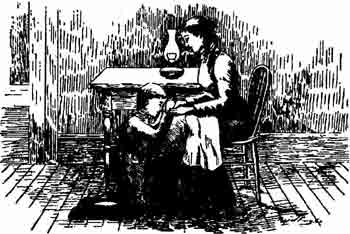
AN HOUR IN MOTHER'S ROOM.
MY mother's room was the prettiest in the whole house. It was large and bright. The west windows were deep and wide, displaying a pleasant landscape. Far away to the edge of the horizon ran a line of hills, and nearer lay the smooth meadow-land through which sluggishly flowed the shining waters of Cedar Creek. The cows loved to stand in its cool waters on hot days, and lazily move their sleepy bodies back and forth with enjoyment. Beside this brook grew the gnarled trunks of old sycamores, and the drooping boughs of the weeping willow, and one tall, straight poplar, that stood out all alone against the sky like a church spire. This poplar was mother's favorite
tree. She said it looked to her like a sentinel keeping guard over the hills and fields and brook.
My mother was a great sufferer for many long years. I cannot remember when she was strong and well. But through all the years of my childhood, I do not recall one cross, complaining, or even impatient word. She was always gentle, always cheerful, always loving. Everybody was welcome in mother's room. Everybody went there when they wanted a cool, quiet, delightful place to rest. My brother Rob and I went every day to bid our mother good-morning, and to say "Our Father" at her knee. I can well remember how she would take our faces between her small hands, and looking into our eyes, she would tell us how she loved and trusted her "two boys," and how she prayed every day that we might grow into noble manhood. It seemed to me it would be impossible for me to do a low, mean act, or even think a vile thought, and then receive my mother's pure kisses. It was a rule at our house that Rob and I were to sit for an hour every day with our mother.
During this hour she read to us or taught us a short poem or some Bible verses, and sometimes she prepared little talks that were full of the truths and principles of Christianity. One of these talks I recall with great clearness. I can never forget it. It has been in my heart all through these years that I have had to fight with the world, and and learn that to control myself was my hardest battle.
It was a dark day in November, about a year before my mother's death. She was not as well as usual that day, so she was lying on her cot when Rob and I tapped softly at her door. She had us draw two footstools beside her, and when we had seated ourselves, mother questioned us about our studies. Then she closed her eyes, and lay very still awhile. Rob and I looked at each other in fear and silence. Presently she again opened her eyes, and taking from her table a new magazine, she opened it, and pointed to the table of contents printed on the first page. She explained to us that whatever we saw named in that table of contents we would find on the inside of the magazine. She told us that we would find more than the mere title. She said there would be an article, sometimes several pages long, sometimes shorter, written under the title given in the table.
Mother then went on to tell us how a boy's face is a table of contents as to what is written on the heart. She told us how easily people could read on a boy's face, honor, courage, truth, gentleness, politeness, and all that speak of the refinement of a truly good and noble heart. But if the character be wicked and vicious, as plainly are written the signs of dishonesty, selfishness, cowardice, vulgarity, and rudeness. Mother said that every noble act, every pure thought, every polite kindness, printed the lines on our faces deeper and plainer.
And just the same way with every low, vulgar thought, every dishonest deed, every rude unkindness,—the face grew more and more degraded, the eyes more sullen and downcast, and every feature gradually became that of an outcast and a ruffian.
She told us how all was written more plainly on the heart than even on the face, and that this is what God looks at and judges men by. Mother said she once saw a criminal who had committed murder. In the fight he had received a deep gash between the eyes. Nothing could ever hide that white glaring scar. No matter how you looked at his face, the mark of his sin was plainly visible.
Having once seen it, you could never forget it.
But our mother said the stain of blood on the prisoner's soul was more terrible and more plainly seen by God's eye than the scar on his face.
Many a year have the rains and winds and sun-shine swept over my sweet mother's grave. Long
ago strangers filled her quiet room, and no more am I a boy, with all a boy's temptations; but
through all these years the teachings of that gentle voice have lived in my heart, and shall live until
I again join that lost mother, and meet the Christ she taught me to worship, and whom she loved so
well.
S. S. Times.